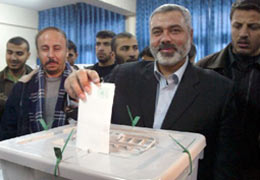
Ismail Haniya (2nd R), top candidate on the Hamas list for
Palestinian parliamentary elections, casts his ballot at a polling station in
Gaza City, Jan. 25, 2006. (Xinhua Photo)
Hamas leader Ismael Haneya cast his ballot in Gaza City on Wednesday for the
Palestinian parliament elections, for which the Islamic group fields candidates
for the first time.
Hamas, a radical militant group sworn to Israel's destruction,boycotted the
first Palestinian parliamentary elections in 1996,citing opposition to the Oslo
Accords.
Haneya, who tops Hamas' candidate list, was seen casting hisvote in a school
serving as a polling station in Shatti refugeecamp of Gaza City.
He expressed hope that his movement, which put up a strong showing in the
latest local Palestinian elections, would achieve success in the race for
parliament seats in the Palestinian Legislative Council (PLC).
Palestinian voters, across the West Bank, the Gaza Strip and East Jerusalem,
started casting ballots early Wednesday to choosean expanded parliament of 132
seats in the 2nd parliamentary election.
Mahmoud al-Zahar, another prominent Hamas leader and one of the movement's
candidates, was also expected to cast his vote in the city.
Hamas, which has been a major driving force behind over five years of
Palestinian uprising against Israel, has generally abided by a truce with Israel
which was reached early 2005.With a surging street popularity, it is poised to
present atough challenge to the ruling Fatah movement led by Palestinian leader
Mahmoud Abbas.
However, Hamas' participation in the elections and its anticipated victory
raised concerns from Israel, which insists that the group be disarmed first and
bars Hamas from participating in the elections.



